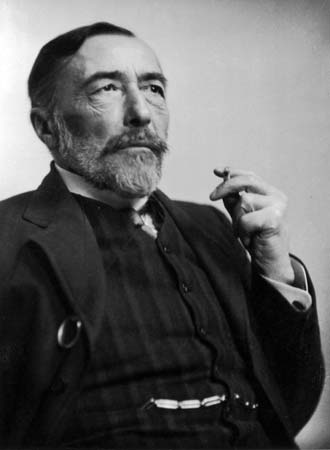Joseph Conrad (http://en.wikipedia.org/wiki/Joseph_Conrad) introduces us to Charles Marlow, an ambitious and adventurous sailor who is employed by an English trading company and sent to an African colony. There he travels up the Congo, visiting the trading stations which barter for ivory with the natives. On his journey he is told about a man named Kurtz whose station is the one furthest up the river, deep in the African jungle. Some talk of him in awe, others in admiration, but they all seem to fear him. As Marlow gets closer and closer to Kurtz he understands that the man has gone insane and is now doing the most horrible and blasphemous deeds. The story becomes a complex exploration of the attitudes people hold on what constitutes a barbarian versus a civilized society and the attitudes on colonialism and racism that were part and parcel of European imperialism. First published by Conrad in 1899.
Follow up an interest in Conrad with J. H. Stape, ed., The Cambridge Companion to Joseph Conrad, Cambridge University Press, (2006) (http://www.amazon.co.uk/Cambridge-Companion-Joseph-Companions-Literature/dp/0521484847/ref=sr_1_cc_1?s=aps&ie=UTF8&qid=1389135990&sr=1-1-catcorr&keywords=cambridge+companion+conrad)
The 1979 film ‘Apocalyse Now’ (http://www.imdb.com/title/tt0078788/?ref_=sr_1), directed by Francis Ford Coppola, sets the tale in the late twentieth century context of the Vietnam War. Martin Sheen plays Captain Benjamin L. Willard (representing Charles Marlow) and Marlon Brando plays Colonel Walter E. Kurtz (representing trading agent Mr. Kurtz). Denis Hopper, Robert Duvall and Harrison Ford also feature.
Available on DVD at http://www.amazon.co.uk/Apocalypse-Now-Disc-Collectors-Edition/dp/B005GJTKYW/ref=sr_1_1?ie=UTF8&qid=1387548251&sr=8-1&keywords=apocalypse+now
Listen to a 45 minute discussion from the R4 ‘In Our Time’ series at the link http://www.bbc.co.uk/programmes/b0077474 either before or after reading the novel. With Laurence Davies, Robert Hampson and Susan Jones.
Check if Heart of Darkness it is in stock at your local library by consulting the online catalogue here Home | South Lanarkshire Libraries (sllclibrary.co.uk)
192 pages in Penguin paperback edition
First published 1899
ISBN 978-0141441672
Joseph Conrad contemplates ‘The Horror..The Horror..’



